Diplomatic Bluebook 2019
Chapter 3
Japan's Foreign Policy to Promote National and Global Interests
2 Rule-Making to Bolster Free and Open Global Economic Systems
(1) Promotion of Economic Partnerships
Economic Partnership Agreements (EPAs) and Free Trade Agreements (FTAs) help capture the vitality of the growing market overseas and strengthen the basis of the Japanese economy, through measures such as the reduction or elimination of tariffs on goods as well as barriers on trade in services, and through rule-making for trade and investment. The Government of Japan has signed and brought into force 18 EPAs with 21 economies to date. The FTA ratio in Japan's trade (the ratio of trade value with countries which have FTAs already signed or entered into force with Japan to the total trade value) was 51.6% at the end of December 2018, will be 85.8% when including the trade amount of economies with which Japan is currently negotiating EPAs. 11 countries signed the TPP11 Agreement in March 2018, and it entered into force on December 30. In addition, active and tireless negotiations spanning many long years have also borne fruit, as exemplified by the signing of the Japan-EU EPA in July 2018, and its entry into force on February 1, 2019.
Japan, as a champion of free trade, will work toward the steady implementation of the Japan-EU EPA and the steady implementation and expansion of the TPP11 Agreement and will continue to promote global trade liberalization through negotiations of other EPAs.
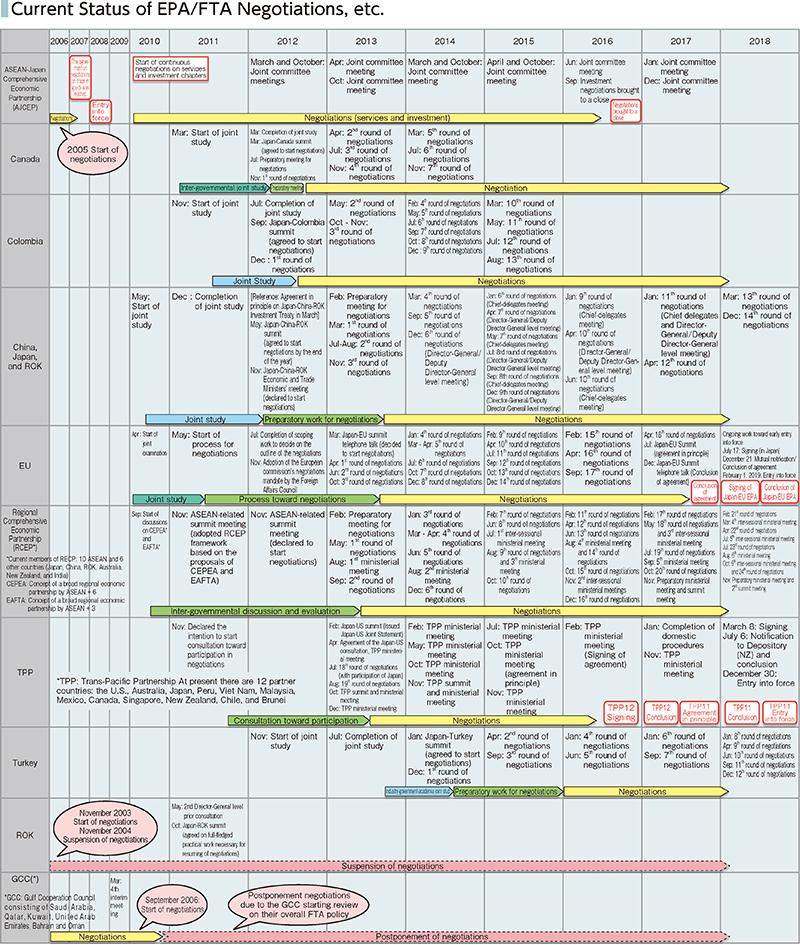
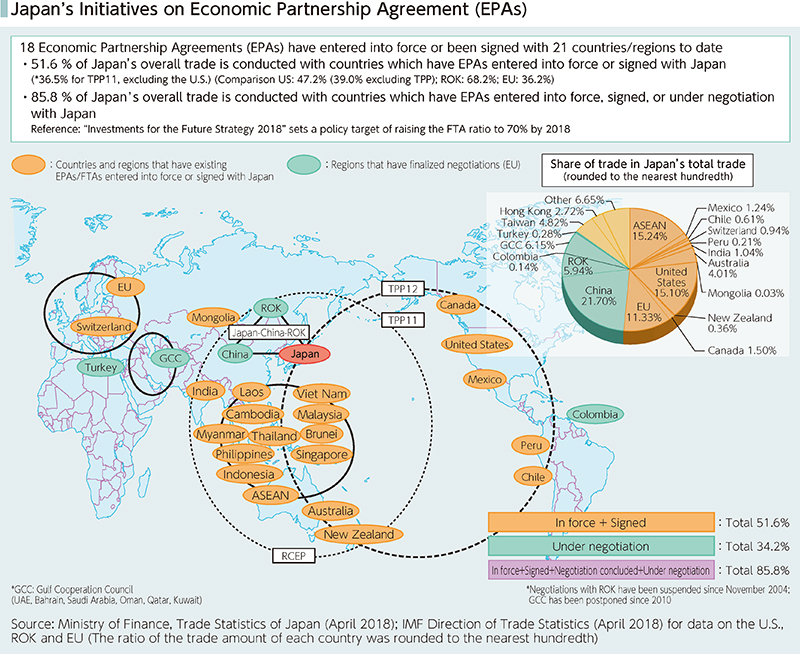
A Multilateral Agreements
(A) TPP11 Agreement
The TPP11 Agreement is an effort to establish new trade and investment rules in a wide range of areas, including tariffs, services, investments, intellectual property, and state-owned enterprises in the fast-growing Asia-Pacific region. It will provide Japanese companies an opportunity to be more active in markets overseas and will be a major driving force for the economic growth in Japan. Furthermore, the strengthening of the rule of law in economic terms with countries that share fundamental values through the TPP11 Agreement has strategic significance that contributes to Japan's security and to stability in the Asia-Pacific region.
The 12 countries of Japan, Australia, Brunei, Canada, Chile, Malaysia, Mexico, New Zealand, Peru, Singapore, the U.S., and Viet Nam signed the TPP12 Agreement in February 2016, but the U.S. announced its withdrawal from the TPP12 Agreement in 2017. As such, in order to bring about the early realization of TPP as soon as possible among the 11 countries, Japan proactively led the discussions. As a result, at the TPP Ministerial Meeting held in Da Nang, Viet Nam in November 2017, the Ministers agreed to move forward with the TPP11 Agreement among 11 countries, by incorporating the articles of the original TPP12 Agreement drawn up by the 12 countries into the new TPP11 Agreement, while exceptionally suspending the application of certain articles (agreement in principle). Later, in March 2018, the TPP11 Agreement was signed in Santiago, Chile. Japan completed domestic procedures second, following Mexico, and in July notified New Zealand, which is designated as the Depositary of the Agreement, of the completion of its domestic procedures. Subsequently, as a result of Japan's active efforts in pushing the countries which have yet to complete its domestic procedures, the six parties required for the Agreement to enter into force completed the necessary procedures, and the Agreement entered into force on December 30 of the same year, based on Article 3 of the TPP11 Agreement.
Amidst the spread of protectionist sentiments around the world, this sends a strong message of promoting free trade from Japan to the world and is a major step toward extending free, fair, and modern trade and investment rules in the Asia-Pacific region. Japan will continue to lead discussions in the implementation and expansion of the TPP11 Agreement, through the hosting of the 1st TPP Commission at ministerial level in January 2019, and other measures.
(B) Japan-EU EPA
Japan shares fundamental values with the EU, which is one of Japan's most important partners in terms of trade and investment. In March 2013, Japan launched negotiations with the EU for an EPA. In July 2017, after four years and four months of the negotiations, an agreement was reached in principle and later in that year, in December, the negotiations were finalized. In the first half of 2018, work was carried out intensively to finalize the text and on July 17, 2018 at the EU-Japan Summit Meeting, the agreement was signed by Prime Minister Abe, European Council President Tusk and European Commission President Juncker. The agreement had originally been scheduled to be signed in Brussels where the EU is headquartered. However, due to the heavy rain disaster which shook western Japan, Prime Minister Abe's visit to Europe was canceled so that he could stay in Japan to put all possible rescue measures in place. Considering the urgency, European Council President Tusk and European Commission President Juncker changed their respective schedule in a short time and travelled to Japan. Thus, the signing ceremony took place successfully in Tokyo.
After the signing, Japan and the EU quickly embarked on preparing for certain domestic procedures with a view to bringing the agreement into force at an early stage. In September 2018, members of the International Trade Commission, who are responsible for deliberating the agreement before European Parliament, visited Japan to meet with Foreign Minister Kono and Special Adviser to the Prime Minister Miyakoshi, among others. It was confirmed at this meeting that the agreement had not only economic significance but also great strategic importance, and that they should continue to cooperate for an early approval and entry into force of the agreement. Later in 2018, Japan and the EU further confirmed to cooperate for the purpose of an early entry into force of the Japan-EU EPA at the Japan-EU Summit Meeting held at the Asia-Europe Meeting (ASEM) in October and at the Japan-EU Summit Meeting during the G20 Summit in Argentina in December. Consequently, the Japanese Diet approved the Agreement during the extraordinary session in the autumn, while the EU completed its procedures in the same year. In December, Japan and the EU notified each other of the completion of their respective domestic procedures. On February 1, 2019, the agreement entered into force.
(C) Regional Comprehensive Economic Partnership (RCEP)
The RCEP is a pillar of East Asian economic integration, aimed at realizing the establishment of an integrated economic zone that covers approximately half of the world population, and about 30% of the world's gross domestic product (GDP) and total trade amount. Since the launch of negotiations in May 2013, the Association of Southeast Asian Nations (ASEAN) member states and their FTA partner states (six countries, namely Japan, China, the ROK, Australia, New Zealand and India) have been working together to advance negotiations toward a comprehensive and high-level agreement in areas that include trade in goods, trade in services, investment, competition, rules of origin, intellectual property, electronic commerce, and customs procedures and trade facilitation. As of December 2018, 14 ministerial meetings and 24 rounds of negotiations have been held. At the 2nd RCEP Summit held in November 2018, coinciding with the ASEAN Summit, the leaders of RCEP negotiating countries issued the “Joint Leaders' Statement on the Regional Comprehensive Economic Partnership (RCEP) Negotiations.” This Joint Leaders' Statement welcomed the substantial progress made in RCEP negotiations in 2018 and expressed their determination to conclude a modern, comprehensive, high quality, and mutually beneficial RCEP in 2019.
(D) Japan-China-ROK FTA
The Japan-China-ROK FTA is a negotiation with Japan's major trading partners: China and the ROK. The negotiations were launched in March 2013, and 14 rounds of negotiations were held by December 2018. The three countries have been engaged in discussions over a wide range of areas including trade in goods, investment, trade in services, competition, intellectual property and electronic commerce, with the shared objective of pursuing a comprehensive, high quality, and mutually beneficial FTA.
(E) Free Trade Area of the Asia-Pacific (FTAAP) Concept
Regarding eventual realization of the FTAAP, discussions are being held at Asia-Pacific Economic Cooperation (APEC) on next-generation trade and investment issues that need to be addressed, and capacity building programs mainly for developing economies are being implemented. While the 2018 APEC Economic Leaders' Meeting in Papua New Guinea welcomed the progress made in implementing the Lima Declaration on the FTAAP adopted at the 2016 APEC Economic Leaders' Meeting, further progress was sought to enhance the ability of APEC economies (countries and regions) to participate in high quality, comprehensive free trade agreements in the future, and officials were instructed to report progress to leaders in 2020.
Following 2017, Japan held a workshop on competition policy in 2018 in order to build capacity for developing economies, and discussions were conducted to identify desirable and optional elements that are essential to future competition chapter in FTAs/EPAs.
The fact that the TPP11 Agreement entered into force in 2018, and the progress in negotiations toward the early conclusion of the high quality RCEP Agreement can be regarded as significant from the viewpoint of achieving a comprehensive and high quality FTAAP.
B Bilateral Agreements and Other Agreements (Arranged in Chronological Order According to the Time at which Negotiations Started)
(A) Republic of Korea (ROK)
Japan and Korea are the third largest trading partners with each other. Based on the recognition that EPA negotiations with the ROK will provide both countries with a stable economic framework and bring about mutual benefits for the future, both countries launched negotiations in 2003 but they have been suspended since 2004.
(B) Gulf Cooperation Council (GCC)
For Japan, the GCC member states (the six countries of Bahrain, Kuwait, Oman, Qatar, Saudi Arabia, and the United Arab Emirates) constitute one of the most important regions as an oil and gas supplier and, a market for exporting infrastructure and others. The Japan-GCC FTA negotiations were launched in 2006 to reinforce economic ties with GCC member states, but they have been suspended since 2009 on the grounds of the GCC side. Japan has been calling for an early resumption of the negotiations with the aim of further strengthening economic ties with the GCC.
(C) ASEAN
The ASEAN-JAPAN Comprehensive Economic Partnership (AJCEP), concluded with 10 ASEAN countries, is Japan's first multilateral EPA. Since the launch of negotiations in 2005, based on the agreement between the Leaders in 2004, 11 formal negotiations have been conducted, and the conclusion of negotiations was confirmed among the Leaders in 2007. Since 2008, the Agreement has entered into force in each participating country. The Leaders confirmed the conclusion of negotiations on trade in services and investment, which started in 2010, with the former ending in 2015 and the later concluding in 2016. After that, various legal and technical confirmations and adjustments were made to the text, with the aim for the signing and entry into force of the agreement in 2019.
(D) Canada
In 2012, Japan launched EPA negotiations with Canada, with which Japan shares fundamental values and has a complementary economic relationship. Seven rounds of negotiation meetings had been held by November 2014, in order to achieve an EPA that can contribute to the stable supply of energy, minerals and foodstuffs to Japan.
(E) Colombia
In 2012, Japan started EPA negotiations with Colombia, a country rich in resources and that has accomplished a high economic growth rate. By December 2015, 13 rounds of negotiations had been held.
(F) Turkey
Japan agreed to launch EPA negotiations with Turkey, a country with high economic potential, which promotes an open economy, at the Japan-Turkey Summit Meeting in 2014, and began negotiations the same year. 12 rounds of negotiations had been held by the end of December 2018 and negotiations are accelerating.
C Existing EPAs
The existing EPAs contain provisions concerning the joint committee, which is a body that discusses the implementation of the agreements, and a process to review the agreements after a certain period of time since their entry into force. In addition, a variety of consultations are being held in order to smoothly implement the existing EPAs.
D Movement of Natural Persons
In accordance with the EPAs, Japan has been accepting candidates for nurses and certified careworkers from Indonesia, the Philippines and Viet Nam. In 2018, 329 Indonesians (31 nurses and 298 careworkers), 322 Filipinos (40 nurses and 282 careworkers), and 219 Vietnamese (26 nurses and 193 careworkers) were accepted into Japan. In 2018, 78 nurses (29 Indonesians, 31 Filipinos, and 18 Vietnamese) and 213 careworkers (62 Indonesians, 62 Filipinos, and 89 Vietnamese) passed the national examination.
E Investment Treaties / Tax Conventions / Agreements on Social Security
(A) Investment Treaties
Investment treaties constitute an important legal basis to promote investments, by stipulating the protection of investors and their investment property, enhancement of transparency in regulations, expansion of investment opportunities, procedures for investment dispute settlement, etc. In order to promote the improvement of the investment environment overseas and to attract foreign investment to the Japanese market, Japan has actively engaged in concluding investment treaties.
In 2018, investment treaties were signed with Armenia in February, the United Arab Emirates in April, Jordan in November, and Argentina in December. As of the end of December 2018, there are currently 42 investment-related treaties that have entered into force (29 investment treaties and 13 EPAs), and six (four investment treaties and two EPAs) that have been signed but not yet entered into force, bringing the total to 48, covering 76 economies. Including investment-related treaties that are currently under negotiation, they will cover 93 economies, and around 94% of Japan's direct investments overseas (as of the end of December 2018)1.
The “Action plan aiming to facilitate an investment environment through promoting the conclusion of investment-related treaties” was formulated in May 2016. It stipulated the goal to sign and enact investment-related treaties with 100 economies by 2020. Japan aims to actively advance investment-related treaties with resource producing countries such as the Middle East, Africa, and Latin America in order to achieve the Action Plan's goals. The Middle East is a major supplier of energy resources for Japan. In addition to abundant resources and promising markets, Africa has shown high economic growth rates in recent years. Many countries in Central and South America share fundamental values, such as Mexico, Chile, and Peru, with which Japan cooperated to promote the TPP11 Agreement, and their economic relationship with Japan is further deepening. Japan will continue to actively advance investment-related treaties from the perspective of incorporating the growth of emerging economies through overseas investment and attracting foreign investment into the Japanese market.
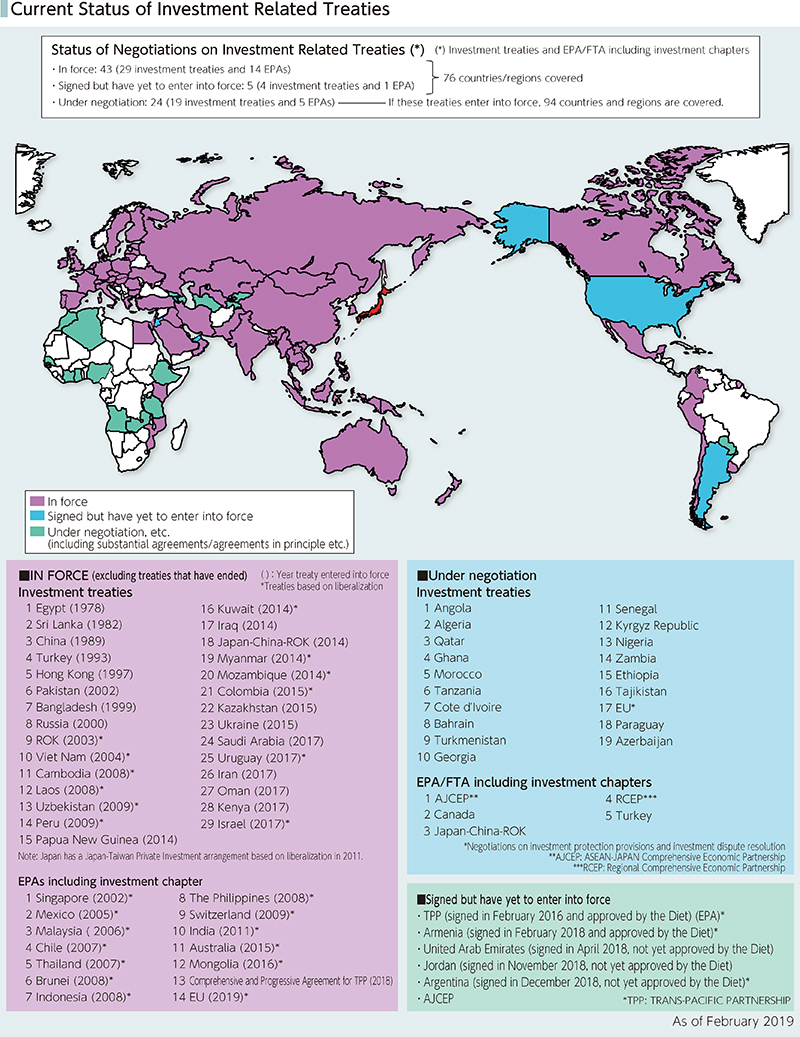
- 1 “Regional balance of Direct Investment (Assets),” Ministry of Finance (All regions) (As of the end of 2017)
(B) Tax Conventions
Tax conventions are intended to eliminate international double taxation in cross-border economic activities (e.g., to reduce or exempt withholding taxes imposed on investment income such as dividends, etc.), or to prevent tax evasion or avoidance, and provides an important legal basis for promoting sound investment and economic exchanges between two countries. Japan is actively working in line with the government's policy that “The Government will expand tax treaty networks, both in terms of quality and quantity, that are necessary for supporting sound overseas business expansion of Japanese companies, through concluding new treaties with countries/regions where investment relations with Japan are expected to develop, as well as amending existing treaties.” (“Growth Strategy 2018” (Cabinet decision, June 15, 2018))
In 2018, the tax convention with Lithuania (August), the tax convention with Estonia (September), the new tax convention2 with Russia (October), the new tax convention with Austria (October), the tax convention with Iceland (October), the amendments to the agreement for the exchange of tax information with the Bahamas (December), and the new tax convention with Denmark (December) came into force. Deposition of an acceptance letter (September) was made for the “Multilateral Convention to Implement Tax Treaty Related Measures to Prevent Base Erosion and Profit Shifting” (Convention to Implement Measures to Prevent BEPS). Additionally, a new tax convention with Spain (October), a tax convention with Croatia (October), and a tax convention with Colombia (December) were signed. Furthermore, negotiations on the conclusion of a tax convention with Ecuador (September), a tax convention with Argentina (December) and a tax convention with Jamaica (December) have reached substantial agreement. As of the end of 2018, Japan has signed 74 tax conventions, etc., which apply to 127 economies.
- 2 The new tax convention is to completely revise the existing tax convention.
(C) Agreements on Social Security
The purpose of agreements on social security is to resolve the issues of double payment of social security insurance premiums and no refund of annuity insurance. It is expected to facilitate people-to-people exchange and strengthen further bilateral relations including economic exchanges, by reducing the burden on Japanese companies and citizens working overseas. The total number of countries that have concluded or signed such agreements with Japan now stands at 21 as of the end of 2018. In addition, in 2018, Japan held negotiations for new agreements with Sweden, Viet Nam, and Finland.
(2) Initiatives with International Organizations (WTO, OECD, etc.)
A World Trade Organization (WTO)
(A) Features
Japan has achieved its present prosperity as the largest beneficiary of the free trade system. The WTO is the core of the multilateral trading system, and its functions act for (1) a place for negotiations for trade liberalization and rule formation, (2) monitoring the implementation status of the WTO Agreement by the Members, and (3) operation of a system3 to settle trade disputes among Members in accordance with the WTO Agreement.
- 3 The dispute settlement system is positioned as a pillar that gives the WTO system stability and predictability. If a dispute is not resolved through the consultations process the dispute settlement procedures provide for, the disputing member may refer the disputed measure at issue to a panel for addressing, inter alia, the consistency of the measures concerned with the WTO Agreements. A party dissatisfied with a finding by the panel may appeal to the Appellate Body to contest the panel's findings. Since the establishment of the WTO in 1995 through to December 6, 2018, Japan was involved as a party in 40 out of 572 disputes (the number of cases for which requests for consultation were made). The Appellate Body is composed of seven Members and the term of Members is four years (Members may be reappointed once). To date, three Japanese nationals have served as Appellate Body Members.
(B) Development after the 11th WTO Ministerial Conference
At the 11th WTO Ministerial Meeting (MC11) in December 2017, in addition to deciding on a work plan for fishery subsidies, etc., under Japan's initiative, one result was that 71 WTO Members, including the U.S., the EU, and many developing country Members, joined to issue a joint statement saying that they will undertake exploratory work for future WTO negotiations on the trade-related aspects of e-commerce. On the other hand, it did not lead to the issuance of a Ministerial Declaration by all participating Members, once again showing the difficulty of unanimous agreement at the WTO.
At the informal Swiss government-sponsored ministerial meeting held at Davos in January 2018, about one month after MC11, Parliamentary Vice-Minister for Foreign Affairs Okamoto, who attended on behalf of Japan, and other countries voiced opinions that MC11's results are not entirely satisfactory and that there is room for improvement in the way in which work is conducted at the WTO. At the informal ministerial meeting held in March in Delhi, under the Indian government's initiative to promote frank opinion exchanges at the ministerial level, Parliamentary Vice-Minister for Foreign Affairs Okamoto and other WTO Members spoke on the importance of flexibility when engaging in negotiations and discussions, and on the need to improve WTO functions. In addition, on the problems with regard to trade and development, many Members brought up the importance of flexible responses, such as not treating all developing countries uniformly, but handling each country according to differences in its economic scale and development level.
Continuing at the informal ministerial meeting in Paris in May, there were frank discussions on how to proceed with negotiations at the WTO in the future and how to strengthen the WTO system. Minister of Economy, Trade and Industry Seko and Parliamentary Vice-Minister for Foreign Affairs Okamoto from Japan attended, advocating for how important it is to work on updating and strengthening WTO rules so that they conform to today's economy, for the work toward better functioning of the WTO such as the enhancement of performance monitoring functions through compliance with and enhancement of reporting obligations and solutions of issues with the WTO dispute settlement system through discussions.
(C) WTO Reform Debate
While the WTO's roles are being debated, 20 years have passed since the establishment of the WTO, and there is a growing sense of crisis among the Members that the WTO may not be sufficiently adapting to structural changes even though the state of the world economy has changed significantly due to the rise of emerging countries and the digitization of the economy. Coupled with the problem that the selection process for the Appellate Body Members of the WTO dispute settlement system has not been started, there is growing awareness and momentum among Members regarding the need for WTO reform and modernization. For example, the Charlevoix G7 Summit Communiqué released in June states that “We commit to modernize the WTO to make it more fair as soon as possible.” There are various opinions and proposals from Members on which functions of the WTO should be reformed. The discussions are mainly about (1) enhancement of the agreement performance monitoring function, (2) reform of the dispute settlement system, and (3) revitalization of the negotiation function.
Japan also actively contributes to the maintenance and strengthening of the multilateral trading system through WTO reform, and there was agreement among leaders of the U.S. (September), the EU (October), China (October), etc. to proceed with the WTO reform discussions. At the 4th Trilateral Meeting of the Trade Ministers of the U.S., Japan, and the European Union held in September, it was agreed that the three countries and regions would make joint proposals for WTO reform. Furthermore, State Minister of Economy, Trade and Industry Seki and Parliamentary Vice-Minister for Foreign Affairs Tsuji attended the Ottawa Ministerial on WTO Reform, hosted by the Canadian Government in October, and contributed to discussions regarding reform, considering the most effective responses according to the nature of each individual problem, and pointing out that it is important to take an approach of first doing what is feasible to implement. As for individual issues, they actively contributed to discussions regarding, for example, (1) a proposal on strengthening transparency and reporting in November together with the U.S., the EU, etc., (2) leading discussions with Australia, Singapore, etc. in efforts to create new rules in the field of e-commerce, and (3) reform of the dispute settlement system.
In December, the G20 Leaders' Declaration at the G20 Buenos Aires Summit stated that “We therefore support the necessary reform of the WTO to improve its functioning” and decided to confirm progress at the G20 Osaka Summit under Japan's Presidency.
(D) Visit by WTO Director-General Azevêdo to Japan
While WTO reform discussions are intensifying, WTO Director-General Azevêdo visited Japan from November 7 to 8. Japan's active promotion of a free and fair rule-based trading system and its active contribution to the maintenance and strengthening of a multilateral trading system through WTO reform were conveyed to Director-General Azevêdo through a courtesy call to Prime Minister Abe and a dinner with Foreign Minister Kono. In response to this, Director-General Azevêdo expressed his appreciation for the role that Japan plays in maintaining and strengthening the multilateral trading system and, bearing in mind that Japan will be acting as the Presidency of the G20 in 2019, expressed that he wanted to further cooperate with Japan.
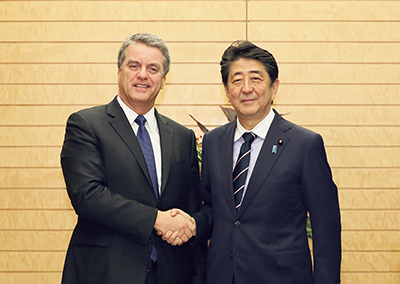 Prime Minister Abe meeting with WTO Director-General Azevêdo (November 8, Tokyo; Photo: Cabinet Public Relations Office)
Prime Minister Abe meeting with WTO Director-General Azevêdo (November 8, Tokyo; Photo: Cabinet Public Relations Office)(E) Dispute Settlement in International Trade
The WTO dispute settlement system is a quasi-judicial system among WTO Members for resolving disputes regarding the WTO Agreements in accordance with the dispute settlement procedures. It serves as a pillar in providing security and predictability to the WTO system. Japan has been involved as a party in the following cases:
The Republic of Korea (ROK)'s import bans on Japanese fishery products: A panel was established in September 2015. In February 2018, a panel report finding the ROK's measures are inconsistent with the WTO Agreement was circulated. In April 2018, the ROK, dissatisfied with the panel's report, appealed to the Appellate Body. The Appellate Body proceedings are currently under way.
Brazil's measures concerning taxation: A panel was established in September 2015. In August 2017, a panel report that found inconsistencies of Brazil's measures with the WTO Agreement was circulated. In September 2017, Brazil, dissatisfied with the panel report, appealed to the Appellate Body. The Appellate Body's proceedings are currently under way. In December 2018, a report by the Appellate Body finding that Brazil's measures are inconsistent with the WTO Agreement was circulated.
The Republic of Korea (ROK)'s measures imposing anti-dumping duties on pneumatic valves produced in Japan: A panel was established in July 2016. In April 2018, a panel report finding the ROK's measures are inconsistent with the WTO Agreement was circulated. In May 2018, Japan appealed to the Appellate Body regarding several points in the panel report, and in June 2018 the ROK, dissatisfied with the panel's report, also appealed to the Appellate Body. The Appellate Body proceedings are currently under way.
India's safeguard measures on imports of certain steel products: A panel was established in April 2017. In November 2018, a panel report that found inconsistencies of India's measures with the WTO Agreement was circulated. India, dissatisfied with the panel's report, appealed to the Appellate Body in December 2018. The Appellate Body proceedings are currently under way.
The Republic of Korea (ROK)'s anti-dumping duties measures for stainless steel bars produced in Japan: A panel was established in October 2018. The panel's proceedings are currently under way.
The Republic of Korea (ROK)'s measures affecting trade in commercial vessels: In December 2018, Japan held bilateral talks with the ROK under the WTO Agreement.
B Organization for Economic Co-operation and Development (OECD)
(A) Features
The OECD is the “world's largest think tank” covering a wide range of economic and social fields such as macro economy, trade and investment, agriculture, industry, environment, science and technology. The OECD makes policy recommendations and forms international norms including through discussions at relevant committees. Japan acceded to the OECD in 1964 as the first non-European and non-American country. Since then, Japan has been actively engaged in the OECD initiatives through discussions at relevant committees as well as through contributions in terms of financial and human resources.
(B) Visit by OECD Secretary-General Gurria to Japan
During the visit by Secretary-General Gurria to Japan in April 2018, he had meetings with Prime Minister Abe, Foreign Minister Kono, and other high-level officials. They reaffirmed the importance of maintaining and strengthening the multilateral trading system, as well as the importance of the future membership of Southeast Asian countries. They also affirmed cooperation toward the 2019 G20, of which Japan was to be its presidency. Secretary-General Gurria also attended the Seminar on Promoting Quality Infrastructure and emphasized the importance of promoting cooperation with Japan for spreading international standards on high quality infrastructure.
(C) The 2018 OECD Ministerial Council Meeting
The OECD Ministerial Council Meeting (MCM) was held in May, chaired by France and under the theme of “Reshaping the foundations of multilateralism.” At the MCM, Japan emphasized fighting protectionism, the importance of maintaining and strengthening free and open trade and investment, and developing quality infrastructure with open and fair access. Japan contributed to discussions in the OECD, as exemplified by the incorporation of its views into the outcome documents. Additionally, the membership of Lithuania and Colombia was decided, and Thailand's Country Program4 was officially launched. Furthermore, the member countries expressed their expectations for the G20 in 2019, confirming the importance of the collaboration between the OECD and the G20.
- 4 A framework to support specific non-member countries to participate in OECD standards and practices in strategic areas in the medium- and long-term, based on the development plans of each target country.
(D) Initiatives in Various Sectors
For the issue of steel excess capacity, following the G20 Summit held in Hangzhou, China in 2016, the Global Forum on Steel Excess Capacity (GFSEC) was established with the participation of China, which accounts for approximately half of the global production volume of crude steel. The Forum adopted a report summarizing concrete policy solutions at the 1st Ministerial Meeting in November 2017 (Berlin, Germany), and then in September 2018 at the 2nd Ministerial Meeting (Paris, France), and compiled a report on the achievements that each country had made. Since December 2018, Japan, as the Presidency of the G20, has assumed the role of Chair of the Forum, exerting strong leadership toward and playing an active role for resolving this issue.
Furthermore, regarding excessive tax avoidance strategies, by multinational enterprises, the “Base Erosion and Profit Shifting (BEPS) Project” was launched in 2012. The BEPS Final Reports were released in 2015. Based on the report, in November 2016, the Multinational Convention to Implement Tax Treaty Related Measures to prevent BEPS was adopted. 67 countries and jurisdictions, including Japan, signed the Convention in June 2017, and in July 2018, the Convention came into effect for the five countries which had in advance deposited letters of acceptance. As of December 2018, 83 countries/jurisdictions have signed, and 17 countries/jurisdictions have concluded. The Convention came into force for Japan on January 1, 2019 after deposition of an instrument of acceptance in September 2018.
(E) Strengthening Relations with Asia
In view of the growing importance of Southeast Asia as a center for the growth of the global economy, OECD places importance on strengthening relations with the region. At the first Ministerial Conference of the Southeast Asia Regional Programme, held in Tokyo in March 2018, discussions regarding “connectivity” and inclusive “participation” (human resource development, education and skills, gender, small and medium size enterprises, etc.) were held under the theme of “Inclusive ASEAN.” From Japan, Foreign Minister Kono attended and stressed Japan's determination to promote cooperation through this program in view of future OECD membership from Southeast Asia.
(F) Contributions in Terms of Financial and Human Resources
Japan was the second largest financial contributor to the OECD after the U.S. in 2017, covering 9.37% of the OECD's mandatory contributions (Part I Budget). Moreover, Japanese nationals have successively served as the Deputy Secretary General (currently Deputy Secretary-General Masamichi Kono), the second-highest position at the OECD Secretariat. Japan and Germany are the largest contributors (2018) to the OECD Development Centre and a Japanese national has been serving as a Deputy Director (Deputy Director Naoko Ueda) of the centre. As described above, Japan supports the OECD through contributions in terms of financial and human resources.
(3) Initiatives in International Meetings (G7 and G20 Summits, APEC, etc.)
A G7 and G20
G7 and G20 Summits continue to play an essential role in providing an opportunity to show Japan's own efforts to the international community and to form a global economic order desirable for Japan.
(A) G7 Charlevoix Summit (Canada)
In the context of the deepening interdependence of the global economy, anxiety and dissatisfaction with regards to globalization are giving rise to the temptation toward protectionist movements, sometimes causing conflicts of interest between countries, the G7 Charlevoix Summit, held in June 2018, confirmed the promotion of a rule-based international order, continuation of fighting against protectionism, and the importance of the rule-based international trading system, and agreed on various measures to promote level playing field. Prime Minister Abe strongly urged the G7, which shares universal values as a driving force in the international community, to play an even more important role and lead discussions on trade, innovation and employment, and North Korea.
①Regarding trade, there were discussions mainly on free and fair trade, improvement of WTO functions, and market-distorting measures such as non-tariff barriers and industrial subsidies.
②Regarding innovation and employment, the leaders shared an awareness of the problem of how to achieve sustainable and inclusive growth while the new technology advances
③Regarding the situation surrounding North Korea, Prime Minister Abe led the discussions and the leaders agreed on the necessity to achieve complete, verifiable and irreversible dismantlement (CVID) of all of its weapons of mass destruction (WMD), ballistic missiles, as well as its related facilities by North Korea, to call for full implementation of relevant United Nations Security Council Resolutions (UNSCRs) by North Korea to this end, and to urge North Korea to take concrete actions. Moreover, support was expressed to Prime Minister Abe's call for understanding and cooperation toward an immediate resolution of the abductions issue, the most important issue of all.
④Regarding gender, cross-disciplinary discussions including the perspective of gender were conducted on all topics, and gender mainstreaming was further accelerated following the G7 Ise-Shima Summit, etc.
⑤Regarding climate change, these were discussions that it is important for the international community to advance the realization of a low-carbon society, in addition to emissions reductions, and that these are not negative for the economy but could go along with growth. In addition the view was presented that they intend to cooperate toward implementation of the Paris Agreement and realization of a circular economy.
⑥Regarding the ocean, active exchanges of opinions were held on the topic of building resilient coasts, strengthening the health of the oceans, and addressing ocean plastic waste. Prime Minister Abe insisted that the knowledge accumulated about disaster risk reduction be used for the people of the world, and that it is necessary to cope with marine debris as a global issue, including developing countries.
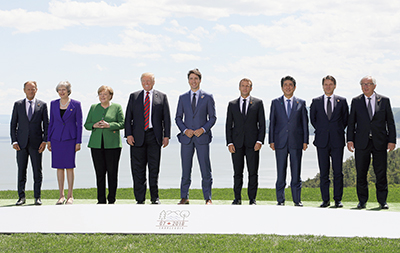 2018 G7 Charlevoix Summit (June 8, Charlevoix, Canada; Photo: Cabinet Public Relations Office)
2018 G7 Charlevoix Summit (June 8, Charlevoix, Canada; Photo: Cabinet Public Relations Office)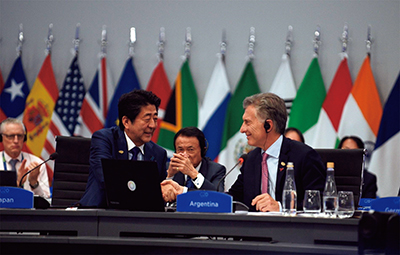 Prime Minister Abe shaking hands with President Macri of Argentina at the closing ceremony of the G20 Buenos Aires Summit (December 1, Buenos Aires, Argentina; Photo: Cabinet Public Relations Office)
Prime Minister Abe shaking hands with President Macri of Argentina at the closing ceremony of the G20 Buenos Aires Summit (December 1, Buenos Aires, Argentina; Photo: Cabinet Public Relations Office)Japan is hosting the G20 Summit for the first time on June 28 to 29, 2019. This Special Feature introduces what the G20 is and what Japan's priority issues are ahead of the G20 Osaka Summit.
The G20 Summit is officially known as the Summit on Financial Markets and the World Economy. It is an international meeting held annually with participation by leaders of Argentina, Australia, Brazil, Canada, China, France, Germany, India, Indonesia, Italy, Japan, Mexico, Republic of Korea, Republic of South Africa, Russia, Saudi Arabia, Turkey, the UK, the U.S., and the EU. Besides the G20 leaders, heads of invited guest countries and representatives of invited guest international organizations also participate in the Summit every year.
The host country of the G20 Summit leads the group over the course of one year from December through the following November as the G20 presidency. The G20 presidency also organizes relevant ministerial and working group meetings.
The G20 has aimed to promote the strong growth of the global economy as the “premier forum for international economic cooperation,” representing more than 80% of the global GDP. As globalization progresses and various issues become more intricately intertwined, the recent G20 Summits have focused not only on macroeconomy and trade, but also on a wide range of global issues which have an immense impact on the global economy, such as development, climate change and energy, health, counter-terrorism, as well as migration and refugees. The G20 has sought to realize an inclusive and sustainable world through its contributions toward resolving these global issues.
At the G20 Osaka Summit, Japan is determined to lead global economic growth by promoting free trade and innovation, achieving both economic growth and reduction of disparities, and contributing to the development agenda and other global issues with the SDGs at its core. Through these efforts, Japan seeks to realize and promote a free and open, inclusive and sustainable society.
In addition, we will lead discussions on the supply of global commons for realizing global growth such as quality infrastructure and global health. As the presidency, we will exert strong leadership in discussions aimed toward resolving global issues such as climate change and ocean plastic waste.
Furthermore, we will discuss how to address the digital economy from an institutional perspective and issues that arise from an aging society. We will introduce Japan's efforts, including the productivity revolution amid a “Society 5.0” era, toward achieving a society where all individuals are actively engaged.
There will be many delegations and journalists from all over the world who will be visiting Japan on the occasion of the Osaka Summit and these ministerial meetings. We will take this as an opportunity to exhibit Japan's “Omotenashi” spirit (hospitality) and introduce the unique aspects and attractiveness of Japan and the host cities to the world.
(B) G20 Buenos Aires Summit (Argentina)
At the G20 Buenos Aires Summit, held from November to December 2018 and under the main theme of “Building Consensus for Fair and Sustainable Development,” the leaders held frank exchanges of views and the Buenos Aires Leaders' Declaration was adopted in the face of risks such as the growing tension in trade relations and the vulnerability of emerging economies.
In adopting the Buenos Aires Leaders' Declaration, Japan led the discussion among leaders as the Lead Speaker at the retreat5 and the session on global economy, and spoke in all sessions. Through the summit meetings and preparatory meetings with each country, Japan as the following G20 presidency had been actively engaged in coordinating different positions and views within the G20 based on the flow of the discussion, and contributed significantly to sending the G20's unified strong message through adopting the Leaders' Declaration.
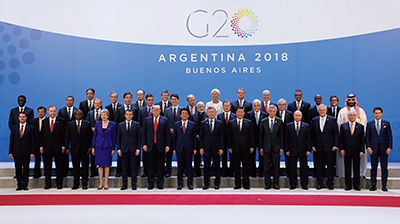 2018 G20 Buenos Aires Summit (November 30, Buenos Aires, Argentina; Photo: Cabinet Public Relations Office)
2018 G20 Buenos Aires Summit (November 30, Buenos Aires, Argentina; Photo: Cabinet Public Relations Office)The main points in the Leaders' Declaration were as follows:
①Work together to improve a rules-based international order.
②Recognize the contribution that the multilateral trading system has made and support the necessary reform of the WTO. Confirm progress at the 2019 G20 Osaka Summit. Also, call on all members to implement the Global Forum on Steel Excess Capacity (GFSEC) recommendations and commitments (e.g., removal of market-distorting support measures).
③Support the free flow of information and continue to work on AI and other emerging technologies.
④Look forward to progress in 2019 on quality infrastructure. Take steps to address debt vulnerabilities in low income countries and work toward enhancing debt transparency and sustainability.
⑤Promote women's empowerment by reducing gender differences in labor participation rates and expanding participation in science, technology, engineering, and mathematics (STEM) fields.
⑥Work on addressing anti-microbial resistance (AMR), realizing Universal Health Coverage (UHC), and strengthening capacities for response to public health emergencies.
At the closing session, Prime Minister Abe assumed the G20 presidency from President Macri of Argentina, and stated his enthusiasm to discuss simultaneously achieving economic growth and addressing disparities, promoting the realization of an inclusive and sustainable future society, advancing the discussion toward a human-centered society in which all stakeholders play an active role by utilizing AI, etc., and in addition his desire to discuss quality infrastructure, global health, climate change, marine plastics, etc.
- 5 A session in which only G20 members and Spanish leaders participated.
B Asia-Pacific Economic Cooperation (APEC)
APEC is a framework of economic cooperation in which 21 economies (countries and regions) in the Asia-Pacific region participate. The Asia-Pacific region is the “world's growth center”, accounting for about 40% of the world's population, about 50% of trade volume, and about 60% of GDP. APEC, in order to liberalize and facilitate trade and investment in the region, conducts activities such as promoting regional economic integration, implementing high-quality growth strategies, and enhancing economic and technical cooperation. The Asia-Pacific region, which thrives by liberalizing trade and investment and strengthening connectivity in accordance with international rules, is the core of the “Free and Open Indo-Pacific” that Japan has been promoting. Japan's contributions to APEC's development are of great significance to Japan's own economic growth and development and to the overseas expansion of Japanese companies.
In 2018, Papua New Guinea chaired APEC for the first time, and the 26th APEC Economic Leaders' Meeting was held from November 17 to 18 in its capital, Port Moresby. At the Meeting, under the overall theme of “Harnessing Inclusive Opportunities, Embracing the Digital Future,” there were discussions on the three priorities of (1) increasing connectivity and deepening regional economic integration, (2) promoting sustainable and inclusive growth, and (3) strengthening inclusive growth through structural reform. Prime Minister Abe attended the meeting and regarded the TPP11 Agreement as the basis of 21st-century rules for trade and investment, and stated that he would aim for early conclusion of the RCEP. He also emphasized the importance of the multilateral trading system with the WTO at its center, and pointed out that the WTO reform should be supported by APEC. In this way, ahead of Japan's presidency of the G20 in 2019 and as a standard-bearer of free trade, he declared that Japan would actively contribute to the prosperity and stability of the Asia-Pacific region, which is the “world's growth center.” Furthermore, emphasizing the importance of promoting quality infrastructure for enhancing connectivity, Japan, as a proponent of the “Free and Open Indo-Pacific” and organizer of the Pacific Islands Leaders Meeting (PALM), announced that it would secure and strengthen Japan's presence in the Asia-Pacific region.
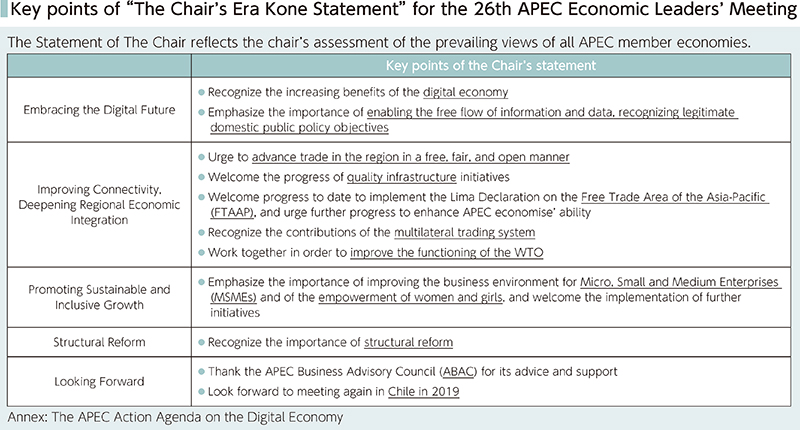
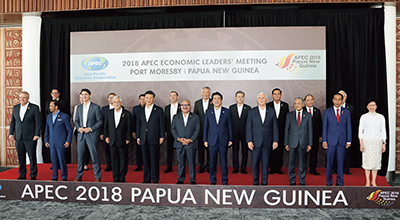 2018 APEC Economic Leaders' Meeting in Papua New Guinea (November 18, Port Moresby, Papua New Guinea (Representative photo); Photo: Cabinet Public Relations Office)
2018 APEC Economic Leaders' Meeting in Papua New Guinea (November 18, Port Moresby, Papua New Guinea (Representative photo); Photo: Cabinet Public Relations Office)In the process of drafting of the Leaders' Declaration, there was no convergence of views on issues such as on support for the multilateral trading system and the fight against protectionism, the 26th APEC Economic Leaders' Meeting was the first time since 1993 that a Leaders' Declaration was not adopted, and the Chair's Statement was issued reflecting the Chair's assessment of the prevailing views of all APEC economies. Nonetheless, the Chair's statement, issued on November 23 includes Japan's priorities such as the contributions made by the multilateral trading system, improving the functioning of the WTO, advancing a free, fair, and open trade, and quality infrastructure.
Chile will host APEC in 2019.
Hideaki Omiya, Chairman of the Board at Mitsubishi Heavy Industries, Ltd.
Have you heard of the APEC Business Advisory Committee (ABAC)? ABAC is APEC's only official private advisory group, composed of representatives from the business world nominated by the leaders of the 21 economies (countries and regions) participating in APEC. In Japan, there are three members1 including myself, who were nominated by Prime Minister Abe. ABAC discusses priority business challenges at four meetings a year and submits policy recommendations to APEC leaders each year. In 2018, we deepened the discussion on the theme “Digitization and Innovation” at the meetings held in New Zealand, Japan, Malaysia and Papua New Guinea.
By obtaining widespread support from the Government of Japan, economic organizations, and relevant companies, the conference held in Japan in April 2018 was the first to be held in Tokyo in 11 years, with more than 200 people attending.
On this occasion, working in cooperation with East Japan Railway Company, we guided the ABAC members to the Tokyo Shinkansen (bullet train) Rolling Stock Center and Tokyo Station, and had a tour of shinkansen vehicles. The Ministry of Land, Infrastructure, Transport and Tourism gave an explanation of the shinkansen system's safety, reliability, life-cycle cost, and contribution to economic development. It was an opportunity to gain a better understanding of Japan's high-quality infrastructure. After that, with Mitsubishi Estate Co., Ltd., we provided a tour of the Marunouchi area, and introduced initiatives of public-private partnership for sustainable development.
In addition, at the “Women's Luncheon (Lunch Session on Women's Economic Participation)” hosted by the economy (country and region) where the conference was held, Minister in charge of Women's Empowerment Seiko Noda introduced the efforts and results of promoting gender equality and women's empowerment in Japan. In the panel discussion that followed, which explored the theme of “women's empowerment in STEM2,” we had Vice Chair of the Board of Councilors at Keidanren Haruno Yoshida, astronaut Naoko Yamazaki, co-founder of H2L Inc. Emi Tamaki and Head of the OECD Tokyo Centre Yumi Murakami conducting active discussions on the proliferation of role models and the encouragement of male cooperation. This event attracted interest from committee members of economies (countries and regions) who face issues in women's active participation in this area, while Japan's efforts were highly praised too.
Every fall at the APEC Economic Leaders' Meeting, ABAC members are given the opportunity to propose policies directly to the heads of each economy (country and region) during the ABAC Dialogue with APEC Leaders. In 2018, the Economic Leaders' Meeting took place in Papua New Guinea, the chair economy. As the facilitator for Prime Minister Abe, I attended along with a group of leaders from countries that included Malaysia, Singapore, and Mexico, and exchanged views on supporting the multilateral trade system and developing policies for the digital age.
We intend to continue to cooperate with the Government of Japan, economic organizations, and relevant businesses to make policy recommendations for boosting Japanese industry.
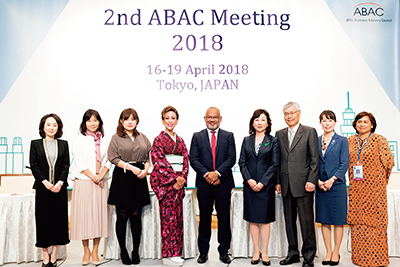 Women's Luncheon (April, Tokyo; Photo: ABAC)
Women's Luncheon (April, Tokyo; Photo: ABAC)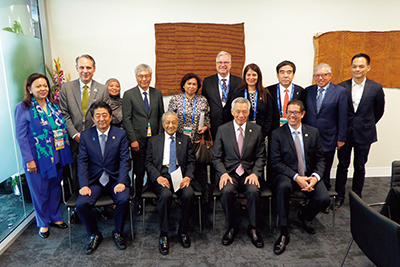 Dialogue between ABAC members and APEC leaders (November, Papua New Guinea-Port Moresby; Photo: ABAC)
Dialogue between ABAC members and APEC leaders (November, Papua New Guinea-Port Moresby; Photo: ABAC)- 1 ABAC Japan members: Hideaki Omiya, Chairman of the Board of Mitsubishi Heavy Industries, Ltd., Motomu Takahashi, Counselor at Mitsui & Co., Ltd., and Nobuhide Hayashi, Chairman of Mizuho Bank, Ltd. Alternate member: Koji Hasegawa, Executive Corporate Adviser at Mitsubishi Heavy Industries, Ltd. (as of December 2018, order of appointment).
- 2 Science, Technology, Engineering, Mathematics
- Note: All job titles are as of the time this column was written.
(4) Intellectual Property
Strengthening the protections of intellectual property is extremely important for the promotion of technological innovation, and eventually for the development of the economy. Japan has actively participated in multilateral consultations, such as APEC, the WTO (TRIPS6 Council), and the World Intellectual Property Organization (WIPO), and is working to develop an environment to ensure that Japanese intellectual property is appropriately protected and utilized overseas. As part of that, in October 2018, Japan deposited its instrument of accession for the “Marrakesh Treaty to Facilitate Access to Published Works for Persons Who Are Blind, Visually Impaired, or Otherwise Print Disabled” to the WIPO, and the Treaty came into force in Japan in January 2019. For EPAs as well, Japan strives to establish regulations on intellectual property rights and thereby to ensure the adequate and effective protection of intellectual property. The Japan-EU EPA came into force on February 1, 2019, and the TPP11 came into force on December 30, 2018, and both incorporate contents on further promotion of the protection and use of intellectual property. Moreover, MOFA, for the purpose of rapidly and efficiently providing assistance for Japanese companies that have suffered from counterfeit and pirated goods, appoints Intellectual Property Officers at almost all of the diplomatic missions overseas, so that they can advise Japanese companies and make inquiries with or requests to their counterpart governments. Japan is also engaged in efforts to improve the capacity of government employees in developing countries to counter the spread of counterfeit and pirated goods, and to strengthen the protection of intellectual property, such as by dispatching experts through the Japan International Cooperation Agency (JICA).
- 6 Agreement on Trade-Related Aspects of Intellectual Property Rights


